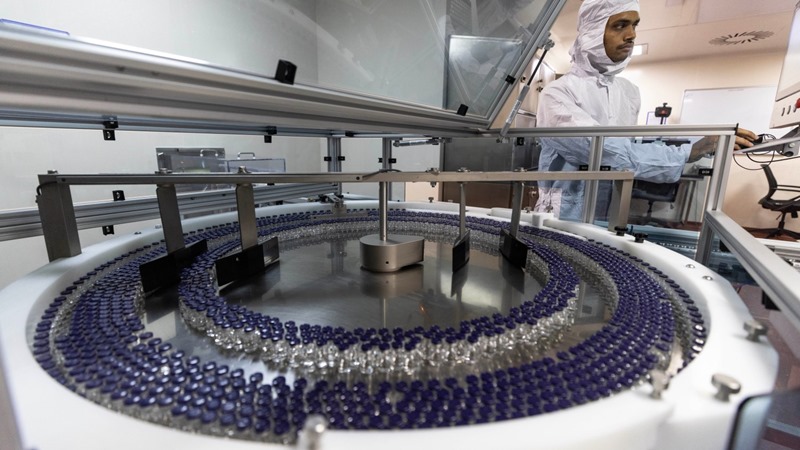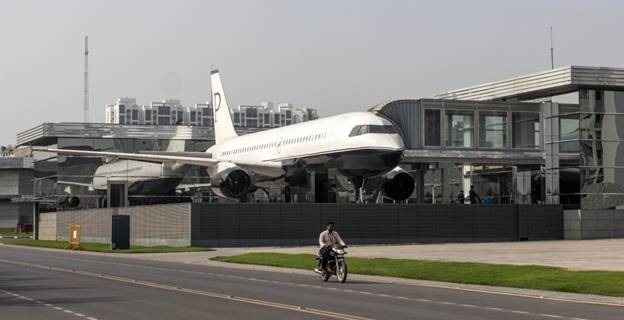There’s every chance your Covid jab was made at the Serum Institute of India, where ambitious staff are on course to eliminate malaria. So why do they worry about Britain?
The anti-malaria drug R21 is manufactured at a rate of 400 doses a minute at the Serum Institute in Pune
Article Ben Spencer | Photographs by Richard Pohle | Sunday Times UK
Machines whirr, glass clinks and every 95 seconds a child’s life is saved. The world’s biggest vaccine-maker — the Serum Institute of India — is gearing up to dispatch 25 million doses of the new R21 malaria vaccine, developed by scientists at the University of Oxford, to Africa next month.
Three years ago, this same laboratory was churning out millions of Covid vaccinations. Now, at the rate of 400 doses a minute, it is waging war on malaria, a disease that kills 600,000 people a year.
But while much of the developing world is crying out for jabs, Adar Poonawalla, the chief executive of the Serum Institute, believes the West has become blasé about vaccination. “It’s complacency,” he said, pointing to the British measles outbreak — the largest seen since the 1990s — which hit the Midlands in recent weeks and is spreading throughout the country.
Whooping cough is also on the rise: on Thursday, the UK Health Security Agency (UKHSA) warned of a new spike among infants after a “steady decline” in vaccination among babies and pregnant women.
“In the developed part of the world you haven’t seen the tragedies caused by these diseases [for many years],” Poonawalla said. “These are very harsh reminders, when these outbreaks come about, that these diseases do exist.” In Birmingham, pictures of the rashes caused by measles have been distributed to GPs because many had never seen cases of the disease before the current outbreak.
An Airbus A320 has been converted into offices and a boardroom for the factory
SUNDAY TIMES PHOTOGRAPHER RICHARD POHLE
Despite the huge success of the Covid vaccine rollout, uptake of routine childhood jabs is now lower in the UK than it was before the pandemic — and for some jabs, the lowest it has been for 15 years.
The Serum Institute, a three-hour drive from Mumbai, employs 8,000 people and has capacity to manufacture 3.5 billion doses a year of a range of vaccines, which it sells to 168 countries around the world. Its products include almost every conceivable vaccine, including measles, tetanus, polio and a new low-cost HPV jab. During the pandemic, two billion Covid vaccine doses were made here — including tens of millions that were sent to the UK.
Its new malaria jab will be rolled out in the next few weeks. Every year, roughly one in every 500 children in Africa under the age of five die from malaria. At those rates — and with vaccine efficacy of 79 per cent — every 630 doses injected will prevent one death.
“We’re really looking forward to being able to contribute to save a lot of lives,” said Poonawalla, 43. “In the coming years we can scale up to 100 million doses a year.”
Adar Poonawalla, the chief executive of the Serum Institute, took over from his father Cyrus
SUNDAY TIMES PHOTOGRAPHER RICHARD POHLE
Poonawalla said a certain degree of “vaccine fatigue” is natural. But seven miles away at Lalwani Mother and Child Care Hospital, in south Pune, children are queueing to receive Serum’s new HPV jab. Dr Sanjay Lalwani, a paediatrician, says that after a dip in the uptake of childhood vaccines during the disruption of the pandemic, demand has shot up among Indian families. “They realise the only way we conquered Covid was through the vaccination programme,” said Lalwani, who runs the hospital with his wife, Sunita, a gynaecologist.
Families in Pune wait for HPV vaccinations supplied to a local hospital by the Serum Institute
SUNDAY TIMES PHOTOGRAPHER RICHARD POHLE
Dr Sunita Lalwani administers Swarnika Landge, ten, with HPV vaccination
THE TIMES
Poonawalla said that in contrast, vaccination complacency in Britain has not only set in among families but in the government, which has failed to boost manufacturing capacity.
When the Oxford-AstraZeneca Covid vaccine was first rolled out in early 2021, Britain’s tiny manufacturing base severely limited supply. Only two factories — Oxford Biomedica in Oxfordshire and Cobra Biologics in Staffordshire — were initially able to make the vaccine, and the government had to outsource production first to a plant in the Netherlands and then to Poonawalla’s Serum factory. When Narendra Modi, the Indian prime minister, imposed an export ban in March 2021 to focus on meeting domestic demand, the UK was left scrabbling for doses.
Matt Hancock, the health secretary at the time, pledged to boost the industry in February 2021, saying: “We are at the forefront of the science, we should be at the forefront of the manufacturing too.” But since then, British vaccine-making has stagnated. “God forbid there’s a pandemic again, because we would be in exactly the same position we were at [in 2020] — nothing has changed,” Poonawalla said.
A visitor to the Serum Institute begins the careful process of putting on personal protective equipment
SUNDAY TIMES PHOTOGRAPHER RICHARD POHLE
The government-funded Vaccines Manufacturing and Innovation Centre in Harwell, Oxfordshire, was sold to a US company in 2022, before construction was even finished, and was then mothballed. Valneva, a French vaccine-maker, had planned to build a state-of-the art factory in Livingston, near Edinburgh, but shifted production to Germany after the government cancelled a contract for 100 million doses of its Covid jab.
Officials point to a deal with Moderna to build a 250-million-dose-a-year factory in Oxfordshire. AstraZeneca last week announced it would invest £450 million in manufacturing in Liverpool, and a deal was signed last year with CSL Seqirus to make emergency jabs in the event of a serious flu outbreak. A UKHSA spokesman said it was “supporting on-going strengthening of the UK’s domestic vaccine manufacturing”. But Poonawalla said far more is needed. By investing in routine vaccine manufacture, ministers could ensure facilities are available to make emergency vaccines in the event of a pandemic.
The institute is able to produce each dose of the R21 malaria vaccine for only $4
SUNDAY TIMES PHOTOGRAPHER RICHARD POHLE
Poonawalla has invested £50 million in Britain’s Oxford Biomedica plant — which first made the Oxford Covid jab — in a bid to keep it “pandemic-ready”, but said government input is needed. “We have made that investment to make the UK a little bit more self-reliant and less dependent on imports,” he said. “But sadly, these facilities and others all over the world will probably end up doing something else, or being shut down, because, quite frankly, if governments don’t support and fund and keep these facilities warm, you can’t have plants just waiting around for a pandemic. You need to support them, at least at a basic cost level, to keep them going. Otherwise we’re just back to square one.”
Poonawalla took over the Serum Institute in 2011 from his father, Cyrus, now 83, who founded the company in 1966. According to the Times of India, in 2021 the Poonawallas were the sixth-richest family in India, with an estimated fortune of $15 billion (£11.8 billion). Adar keeps a stationary Airbus A320 on his factory site, which he has converted into an office and boardroom, and has a collection of 35 rare cars. In December, he bought Aberconway House in Mayfair for £138 million, the second-highest sum yet paid for a home in London.
He says this wealth — and private ownership of the Serum Institute — allows him to keep vaccine prices low. “We don’t believe in making a 1,000 per cent margin on a drug when we can just make a modest margin and still be quite profitable. If you’re listed, you’re chased by your quarterly results. But I’ve got the freedom and luxury to be able to decide, with a small group of individuals, to have flexibility on that, and to be able to take care of inequalities in developing-world countries. That’s really where Serum’s main focus has always been.”
He points out that while Serum is the biggest manufacturer of vaccines by volume, its income is far lower than western competitors. It had a turnover of $3.2 billion in 2022, compared with $100 billion for Pfizer.
The institute employs more than 8,000 people in Pune
SUNDAY TIMES PHOTOGRAPHER RICHARD POHLE
During the pandemic it produced two billion Covid vaccines
SUNDAY TIMES PHOTOGRAPHER RICHARD POHLE
Sir Adrian Hill, the director of the Jenner Institute at Oxford, who was involved in developing both the Covid vaccine and the new malaria jab, said the Serum Institute’s ability to make vaccines both at scale and at low cost is crucial. The R21 vaccine will cost just $4 a dose — compared with $11 a dose for the malaria jab launched in January by its rival, GSK.
GSK is also facing manufacturing limits, with just 6.6 million doses planned this year and next. “There’s no controversy about whether 100 million doses is better than six million,” Hill says. “The cost is much lower and the efficacy is higher.”
Hill is now working on developing better malaria vaccines. Umesh Shaligram, chief scientist at the Serum Institute, believes that a combination of vaccines, all attacking the disease from different angles, will eventually eliminate malaria altogether.
“It will be a big challenge, but within 20 to 25 years, we hope to do it. We are putting a lot of effort into elimination,” he said. “We believe vaccination can do it.”


